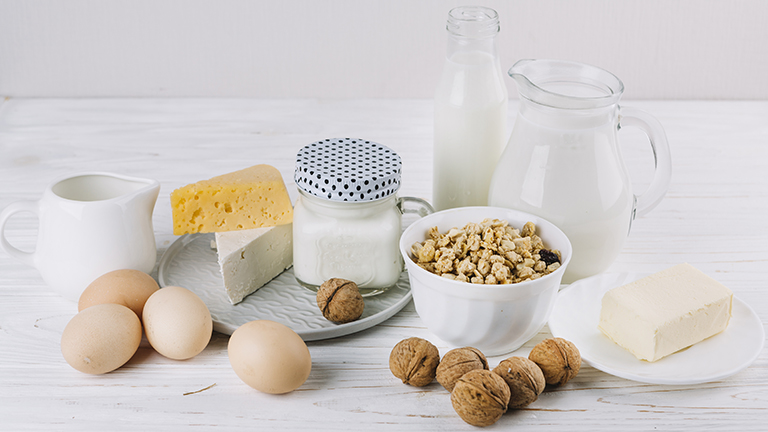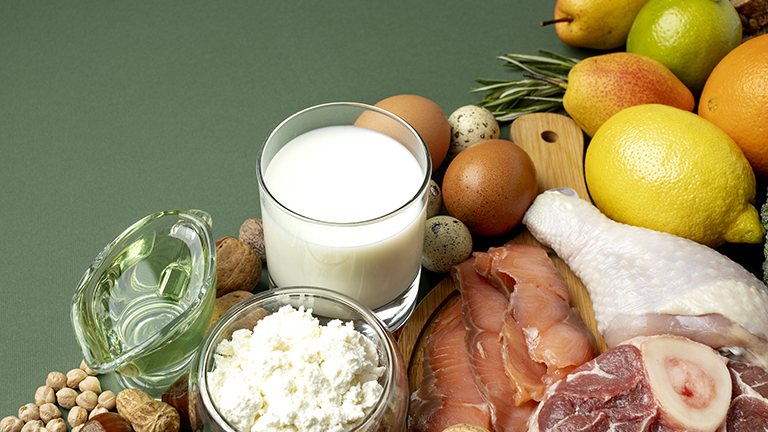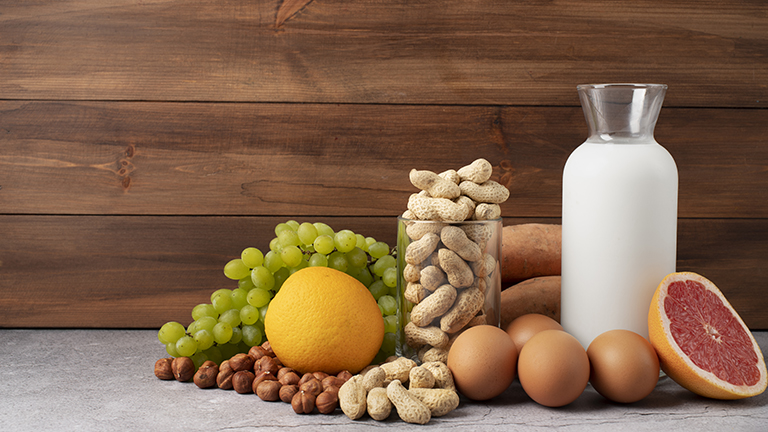Calcium Rich Foods: Calcium is one of the most vital minerals for the human body, particularly for maintaining bone strength and structural integrity. Bones are living tissues that constantly rebuild themselves, and calcium is a primary component of this process. Adequate calcium intake ensures that bones remain dense, resilient, and resistant to fractures. Without enough calcium, bones can become fragile and prone to conditions like osteoporosis and rickets.
Calcium does not only support bones; it also plays a crucial role in muscle function, nerve signaling, blood clotting, and heart health. When dietary calcium intake is insufficient, the body takes calcium from the bones to maintain critical physiological functions, weakening the skeletal structure over time.
How Calcium Helps Prevent Osteoporosis
Osteoporosis is a condition characterised by reduced bone mass and deterioration of bone tissue, making bones brittle and more susceptible to fractures. One of the most effective ways to prevent osteoporosis is by maintaining adequate calcium intake throughout life. Calcium-rich foods provide the necessary minerals to enhance bone density, while lifestyle factors such as regular weight-bearing exercise complement calcium’s benefits. By consistently including calcium-rich foods in your diet, you can protect your bones from age-related deterioration and maintain a strong skeletal system.
[INSERT_ELEMENTOR id=”5108″]
Top Calcium Rich Foods
Dairy Products for Calcium: Milk, Cheese, and Yogurt
Dairy products have long been recognized as some of the most effective sources of calcium. Milk is rich in calcium and often fortified with vitamin D, which enhances calcium absorption. Cheese, particularly hard varieties like parmesan and cheddar, contains a high concentration of calcium per serving. Yogurt is not only calcium-rich but also provides probiotics that support gut health, indirectly aiding nutrient absorption.
Incorporating dairy products into your daily diet can significantly contribute to meeting your calcium needs. People who consume dairy regularly often exhibit higher bone density and lower risk of fractures, especially in older adults.
Leafy Greens and Vegetables High in Calcium
Vegetables can be an excellent source of calcium, especially for those following vegetarian or vegan diets. Leafy greens such as kale, bok choy, and broccoli are naturally high in calcium. Spinach, although rich in calcium, contains oxalates that can reduce calcium absorption, so pairing it with other foods can enhance its benefits. Including a variety of leafy greens in salads, stir-fries, and smoothies ensures a steady intake of plant-based calcium.
Other vegetables like okra, collard greens, and turnip greens are also potent sources of calcium. By incorporating a mix of these vegetables into your diet, you can maintain strong bones while enjoying diverse flavors and textures.
Nuts, Seeds, and Legumes for Strong Bones
Nuts and seeds are not only rich in calcium but also provide healthy fats, protein, and essential minerals. Almonds, chia seeds, sesame seeds, and flaxseeds are particularly high in calcium. Legumes such as chickpeas, lentils, and white beans contribute to bone health by supplying both calcium and magnesium, which work synergistically to strengthen bones.
Adding these foods to daily meals, whether in the form of snacks, toppings, or incorporated into main dishes, ensures a consistent source of calcium while supporting overall nutrition.
Calcium-Fortified Foods and Alternatives
For individuals who are lactose intolerant or prefer plant-based diets, calcium-fortified foods are a practical solution. Fortified plant-based milk such as almond, soy, or oat milk, along with fortified cereals and tofu, provide substantial amounts of calcium. These foods often include added vitamin D to aid calcium absorption, making them comparable to dairy in effectiveness.
By choosing calcium-fortified options, it is possible to meet daily calcium requirements without consuming animal products, supporting bone health in diverse dietary preferences.
Daily Calcium Requirements
Calcium Needs for Children
Calcium is critical during childhood as bones grow rapidly and establish their peak bone mass. The recommended daily intake for children varies by age, with younger children needing smaller amounts and adolescents requiring more to support the growth spurt associated with puberty. Ensuring children consume calcium-rich foods such as milk, cheese, yogurt, and leafy greens helps establish a strong bone foundation that persists into adulthood.
Calcium Needs for Adults
Adults require sufficient calcium to maintain bone mass and prevent age-related bone loss. The recommended daily intake generally ranges from 1,000 to 1,200 milligrams per day, depending on age and gender. Adults can meet these needs through a combination of dairy products, calcium-rich vegetables, nuts, seeds, and fortified foods. Consistency is key, as daily calcium intake directly influences bone density and fracture risk over time.
Calcium Needs for Seniors
As people age, the body’s ability to absorb calcium decreases, increasing the risk of osteoporosis. Seniors often require higher calcium intake, alongside adequate vitamin D, to compensate for this reduced absorption. Incorporating highly bioavailable calcium sources such as dairy, fortified foods, and certain leafy greens is crucial for maintaining bone health in older adults. Regular monitoring and consultation with a healthcare provider can optimize calcium intake and prevent age-related bone complications.
Tips to Boost Calcium Absorption
Importance of Vitamin D
Vitamin D is essential for calcium absorption. Without adequate vitamin D, calcium intake alone may not effectively strengthen bones. Sun exposure, fatty fish, eggs, and fortified foods are excellent sources of vitamin D. Combining calcium-rich foods with vitamin D ensures that the mineral is properly utilized in the body, supporting optimal bone health.
Foods and Habits That Improve Absorption
Certain foods and lifestyle habits can enhance calcium absorption. Consuming calcium with meals that contain protein can improve uptake. Moderate physical activity, particularly weight-bearing exercises like walking or resistance training, stimulates bone remodeling and calcium incorporation. Additionally, pairing calcium-rich foods with vitamin C-rich fruits and vegetables can enhance absorption and promote bone density.
Foods That Reduce Calcium Absorption
Some dietary components can hinder calcium absorption. Excessive consumption of caffeine, high-sodium foods, and certain types of oxalates (found in spinach and rhubarb) can reduce calcium uptake. Moderation and balanced dietary choices are crucial to ensure that calcium-rich foods contribute effectively to bone health.
Sample Calcium-Rich Meal Plan
Breakfast Ideas
A calcium-rich breakfast can include a bowl of yogurt topped with chia seeds and almond slices, accompanied by fortified orange juice. Alternatively, a smoothie made from fortified soy milk, kale, and banana can provide a substantial calcium boost while offering a refreshing start to the day.
Lunch and Dinner Options
For lunch, a salad with bok choy, broccoli, tofu, and sesame seeds delivers high calcium content along with fiber and antioxidants. Dinner options such as baked salmon with a side of collard greens and quinoa or a cheese and vegetable casserole provide both calcium and complementary nutrients for bone health.
Snacks High in Calcium
Snacks like roasted almonds, calcium-fortified granola bars, or hummus with chickpea spread are convenient ways to maintain calcium intake throughout the day. Integrating these snacks into daily routines ensures a steady supply of calcium, supporting bone maintenance between meals.
Lifestyle Habits for Stronger Bones
Exercise and Weight-Bearing Activities
Regular exercise, particularly weight-bearing activities such as walking, running, and resistance training, stimulates bone formation and increases calcium retention. Physical activity strengthens bones by promoting bone remodeling, enhancing bone density, and reducing the risk of fractures.
Avoiding Bone-Weakening Habits
Certain habits negatively affect bone health. Smoking, excessive alcohol consumption, and prolonged sedentary behavior can reduce bone density and impair calcium utilization. Adopting a lifestyle that combines a balanced diet with physical activity helps preserve strong bones and overall skeletal health.
7-Day Calcium-Rich Meal Plan for Bone Health
This meal plan is designed to provide approximately 1,000–1,200 mg of calcium daily, aligning with the recommended dietary allowance (RDA) for most adults. It includes a balance of dairy and plant-based sources, ensuring a variety of nutrients essential for bone strength.
Monday:
- Breakfast: Greek yogurt with chia seeds and sliced almonds
- Lunch: Kale and quinoa salad with chickpeas and a lemon-tahini dressing
- Snack: Fortified orange juice with a handful of walnuts
- Dinner: Grilled salmon with steamed broccoli and sweet potato
Tuesday:
- Breakfast: Oatmeal made with fortified soy milk, topped with dried figs and flax seeds
- Lunch: Tofu stir-fry with bok choy, bell peppers, and brown rice
- Snack: Cottage cheese with sliced strawberries
- Dinner: Sardine salad with mixed greens, cherry tomatoes, and olive oil vinaigrette
Wednesday:
- Breakfast: Smoothie with fortified almond milk, spinach, banana, and peanut butter
- Lunch: Lentil soup with a side of whole-grain bread
- Snack: Roasted almonds and a small piece of dark chocolate
- Dinner: Baked chicken breast with collard greens and quinoa
Thursday:
- Breakfast: Scrambled eggs with sautéed kale and mushrooms
- Lunch: Grilled tofu wrap with avocado, spinach, and whole-grain tortilla
- Snack: Edamame beans with a sprinkle of sea salt
- Dinner: Broiled cod with steamed asparagus and a baked potato
Friday:
- Breakfast: Whole-grain cereal with fortified oat milk and sliced bananas
- Lunch: Spinach and ricotta stuffed whole-wheat pasta
- Snack: Yogurt with a sprinkle of chia seeds and blueberries
- Dinner: Beef and vegetable stew with a side of steamed green beans
Saturday:
- Breakfast: Smoothie bowl with fortified soy milk, mixed berries, and granola
- Lunch: Sardine sandwich on whole-grain bread with lettuce and tomato
- Snack: A handful of dried apricots and sunflower seeds
- Dinner: Grilled turkey burger with a side of sauteed bok choy and brown rice
Sunday:
- Breakfast: Chia pudding made with fortified almond milk, topped with kiwi and coconut flakes
- Lunch: Tofu and vegetable curry with a side of quinoa
- Snack: Sliced apple with almond butter
- Dinner: Baked trout with steamed broccoli and roasted sweet potatoes
Expert Insights on Calcium and Bone Health
According to the National Institutes of Health (NIH), calcium is crucial for maintaining strong bones and teeth, and it also supports muscle function, nerve signaling, and heart health. The recommended dietary allowance (RDA) for calcium varies by age and gender:
- Adults aged 19–50: 1,000 mg/day
- Women aged 51 and older: 1,200 mg/day
- Men aged 51–70: 1,000 mg/day
- Men aged 71 and older: 1,200 mg/day
For individuals who are lactose intolerant or follow a vegan diet, plant-based sources of calcium include fortified plant milks, tofu, leafy greens like kale and bok choy, and fortified cereals. It’s important to note that some plant foods contain compounds that can inhibit calcium absorption, such as oxalates in spinach and rhubarb. Therefore, it’s advisable to consume a variety of calcium-rich foods to ensure adequate intake.
Medical References Supporting Calcium Intake
- U.S. Department of Health and Human Services (HHS): The HHS emphasizes the importance of calcium in the diet, stating that it is vital for building and maintaining strong bones and teeth. They recommend obtaining calcium from dietary sources rather than supplements when possible.
- Harvard T.H. Chan School of Public Health: Harvard’s nutrition source highlights that calcium-rich foods, including dairy products, leafy greens, and fortified foods, are essential for bone health. They also discuss the role of vitamin D in enhancing calcium absorption.
- National Osteoporosis Foundation (NOF): The NOF provides guidelines on calcium intake, suggesting that adults should aim for 1,000–1,200 mg of calcium per day, depending on age and gender. They also recommend weight-bearing exercises to strengthen bones.
- World Health Organization (WHO): WHO’s guidelines on nutrition emphasize the need for adequate calcium intake to prevent bone-related disorders, particularly osteoporosis, in older adults.
Medical Studies on Calcium Intake
Scientific studies consistently demonstrate that diets rich in calcium reduce the risk of osteoporosis and fractures. Long-term research supports the consumption of both dairy and plant-based calcium sources, emphasizing that consistent intake from early childhood through adulthood is crucial for maintaining optimal bone strength.
Frequently Asked Questions (FAQs) Calcium Rich Foods
Can Adults Get Enough Calcium Without Dairy?
Yes, adults can obtain sufficient calcium from plant-based sources and fortified foods. Leafy greens, almonds, tofu, chia seeds, and calcium-fortified plant milks can collectively meet daily calcium requirements.
How Much Calcium is Too Much?
Excessive calcium intake can lead to kidney stones and impaired absorption of other minerals. Adults should generally not exceed 2,500 milligrams per day from all sources, including supplements, unless prescribed by a healthcare provider.
Calcium Supplements vs Natural Food Sources
While calcium supplements can help those who struggle to meet dietary requirements, natural food sources are preferable due to additional nutrients and improved absorption. A balanced diet rich in calcium-rich foods should be the primary approach, with supplements used as necessary.
Conclusion: Calcium Rich Foods
Incorporating a variety of calcium-rich foods into your daily diet is essential for maintaining strong bones and overall health. The 7-day meal plan provided offers a diverse selection of meals that not only meet calcium requirements but also include other nutrients vital for bone health, such as vitamin D, magnesium, and vitamin K.
Remember, it’s important to consult with a healthcare provider or a registered dietitian before making significant changes to your diet, especially if you have existing health conditions or dietary restrictions. They can provide personalized recommendations based on your individual health needs.
By following a balanced diet rich in calcium and other bone-supporting nutrients, along with regular physical activity, you can take proactive steps toward maintaining optimal bone health throughout your life.



